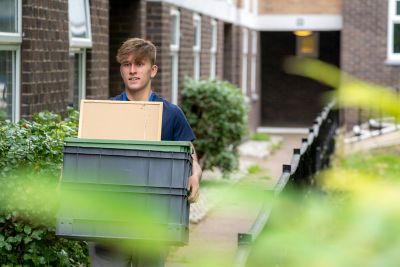What should I take to university?
Deciding what to bring to uni and what to keep at home can be a challenge. Use our packing lists make sure you’ve got everything you need to start your degree.

Deciding what to take to university can seem more difficult than the exams you sat to earn your place.
Our handy packing checklist is designed to make your life easier and the move much smoother.
You'll need to bring your own stationery, including:
pens, pencils and highlighters
study books
lever arch files
A4 file paper
ruler
eraser
stapler
scissors
hole punch
diary/personal organiser
different sized notebooks
Post-it notes

If you own a laptop, you should bring this with you so you can complete your studies and personal use. If you don’t have access to a laptop, you can request a laptop loan, or book a slot to use the computers in the computer rooms or libraries. Any electrical equipment that you bring needs to be under 1200 Watts to comply with our safety regulations.
Other useful electronics include:
printer
Ethernet cable
socket converter (international students)
extension cord
chargers
memory sticks
games consoles
hair dryers and other beauty appliances
music speakers
a small TV (you’ll need a TV licence)

You'll also need to remember to bring correct documentation with you. As a rule, make sure you pack:
your university acceptance letter/confirmation
accommodation paperwork
student finance documents
valid ID (passport or driving licence)
copies of prescriptions you'll need

The type of halls you live in will determine which kitchen tools you’ll need to bring with you. If you’re living in self-catered halls, it’s helpful to find out who you’ll be living with so you can ask whether your future flatmates would like to share certain kitchen equipment. This not only helps save money but also valuable space in your shared kitchen.
Sharing equipment may not be possible, but it’s useful to ask before buying anything. Facebook groups are often used to find future flatmates.
Most self-catered kitchens are kitted out with basic equipment such as:
Kitchen (self-catered):
If you’re living in catered halls, you only need to bring a few essentials to supplement your daily meals.
This may include a mug to make hot drinks and cutlery and plates for snacks.
You'll probably spend a lot of time in your room resting and studying so it’s important you make the space comfortable and homely.
As well as practical items, small decorative touches can help match your room to your personality and taste. Most accommodation is furnished with a bed, desk, wardrobe, and chair so avoid packing these items.
All rooms have a noticeboard, and you can decorate yours in whichever way you choose. Suggestions for your room include:
To ensure you pack everything you’ll need, it’s often useful to think about your daily routine, from getting up to going to bed, and list all the things you use throughout the day. Remember that if you do forget anything, we have several shops around campus and in the city centre where you can pick up supplies.
Items to consider packing include:

You should carefully consider what you need to bring with you - remember space may be limited. It’s a good idea to bring clothing you know you will wear for the current season of the British climate.
Packing appropriately also makes for a great excuse to visit home when you need to swap (and maybe have your laundry done for you too!)
Items to consider packing include: